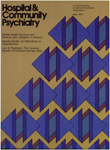Alternatives to Hospitalization Developed by an Urban Mental Health Center: An Overview
Abstract
For 150 years public institutions, caught between society's insistence that all needy persons receive some kind of services and taxpayers' reluctance to support such services, have been forced to take in all patients who have no place to go, without adequate resources for providing services to them. This long experiment on the effects of underfunding has led to the move to develop alternatives to large public institutions. Massachusetts Mental Health Center, which serves its urban catchment area without a backup hospital, has set up a comprehensive system of alternatives to hospital care; serving the chronic patient is a major concern. This paper and the following four papers describe certain aspects of the center's alternatives to hospitalization. They include a four-year follow-up of deinstitutionalized patients, a Quarterway House for patients with persistent severe disabilities, a network of residential placements, and a program for training psychiatric residents in the care of chronic patients.
Access content
To read the fulltext, please use one of the options below to sign in or purchase access.- Personal login
- Institutional Login
- Sign in via OpenAthens
- Register for access
-
Please login/register if you wish to pair your device and check access availability.
Not a subscriber?
PsychiatryOnline subscription options offer access to the DSM-5 library, books, journals, CME, and patient resources. This all-in-one virtual library provides psychiatrists and mental health professionals with key resources for diagnosis, treatment, research, and professional development.
Need more help? PsychiatryOnline Customer Service may be reached by emailing [email protected] or by calling 800-368-5777 (in the U.S.) or 703-907-7322 (outside the U.S.).



